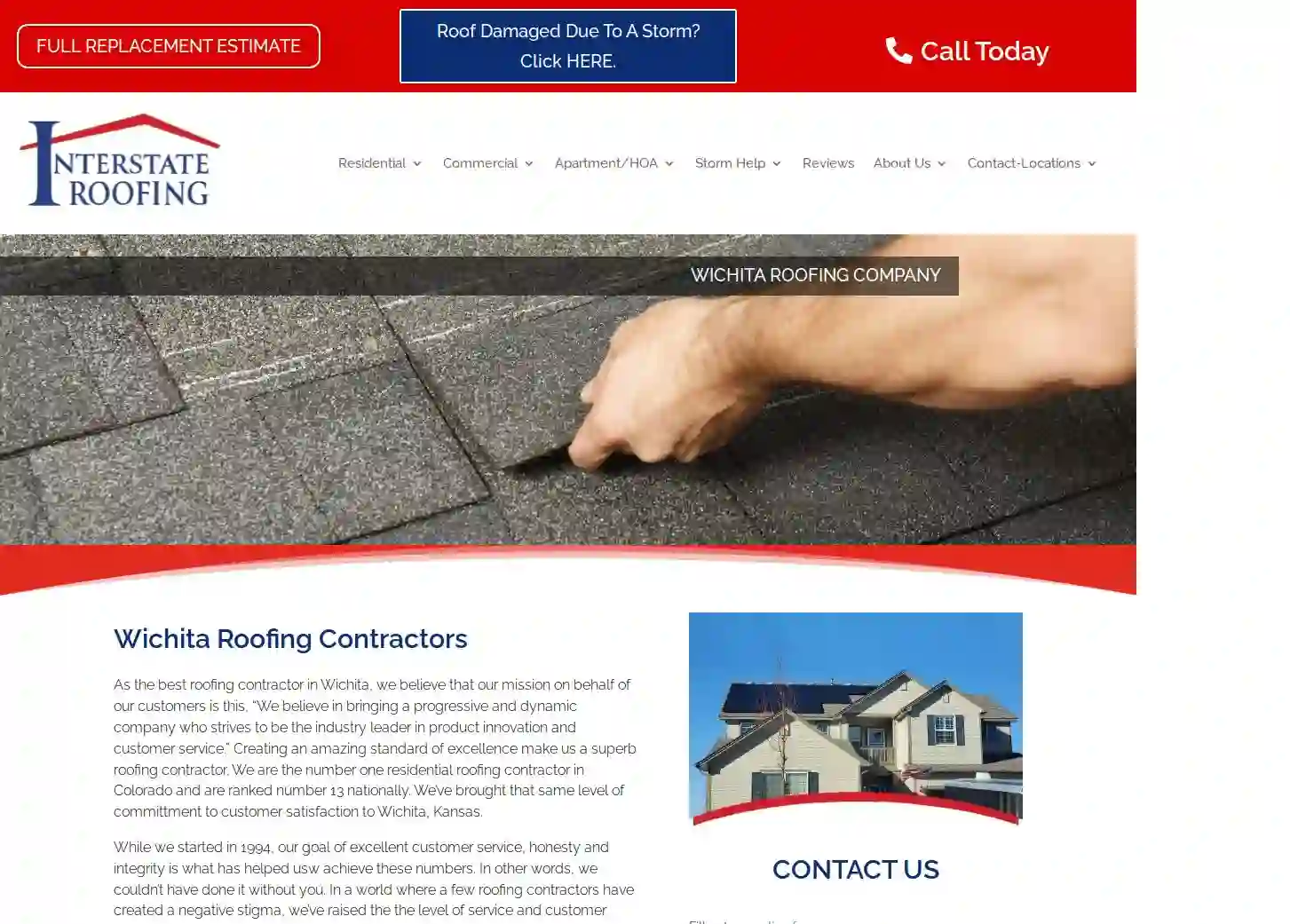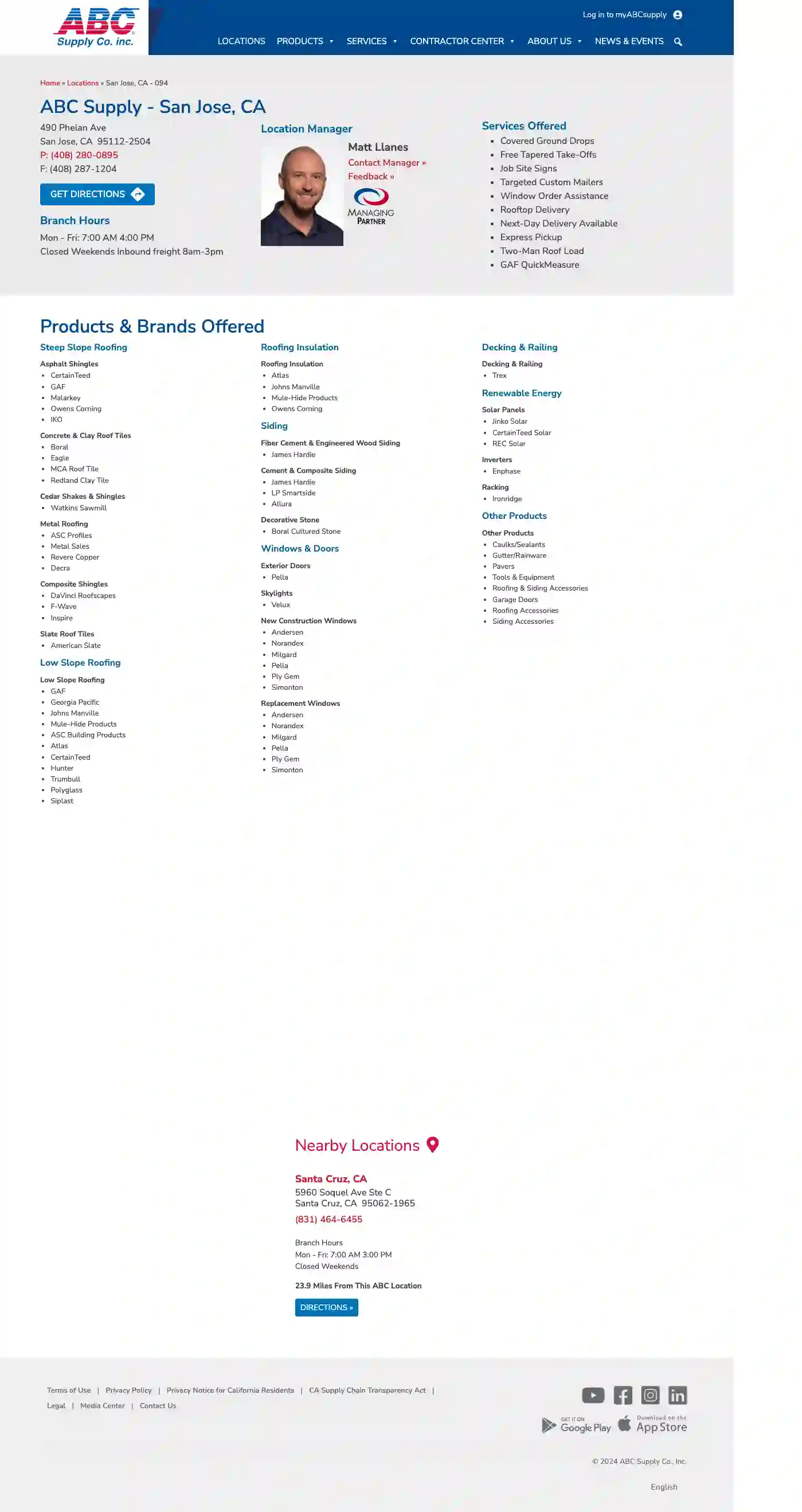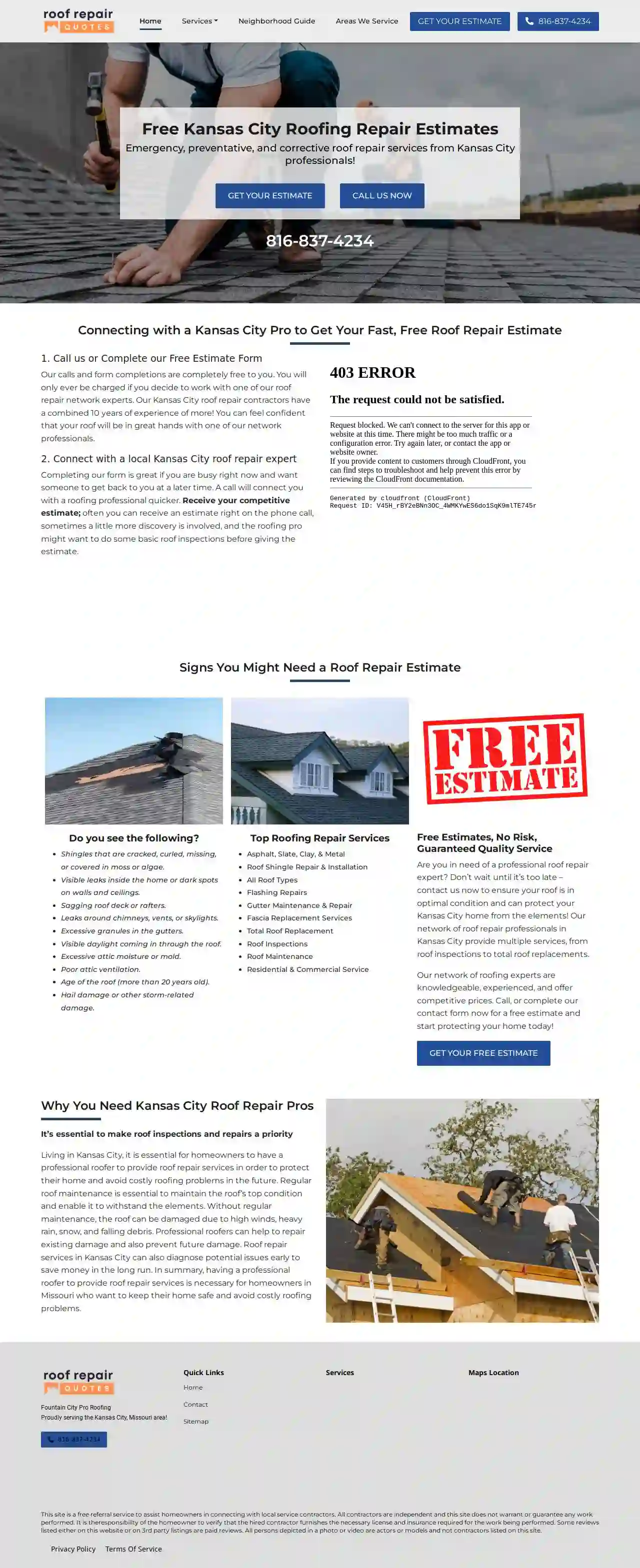Roofing Companies Augusta
Find top Roofing Company in Augusta
Get multiple Roofing Contractor quotes for your project today! Compare profiles, reviews, accreditations, portfolio, etc... and choose the best offer.

Interstate Roofing
Wichita, USWe believe in bringing a progressive and dynamic company who strives to be the industry leader in product innovation and customer service. Creating an amazing standard of excellence make us a superb roofing contractor. We are the number one residential roofing contractor in Colorado and are ranked number 13 nationally. We’ve brought that same level of committment to customer satisfaction to Wichita, Kansas. While we started in 1994, our goal of excellent customer service, honesty and integrity is what has helped usw achieve these numbers. In other words, we couldn’t have done it without you. In a world where a few roofing contractors have created a negative stigma, we’ve raised the the level of service and customer satisfaction to new heights. If you live in the Wichita area and need help replacing, repairing or maintaining your roof give us a call for a free estimate. Roofing Contractors are not all created equally. At Interstate Roofing, our workmanship, attention to detail and dedication to customer satisfaction set us apart from our competitors. If you’ve had a negative experience with a roofing contractor in the past we completely understand. Because of that we decided from the start we were going to aim to change that by exceeding your expectations from a customer service standpoint. Honesty and integrity rule the roost at Interstate roofing. As a mid-sized local company, our focus on residential and commercial growth has made us one of the largest roofing contractors in the United States. We are present in 10 locations nationwide and consider ourselves experts in insurance restoration. Choosing a residential and commercial Wichita roofing contractor can be an undertaking and should not be taken lightly. We adhere to the highest standards and best indu
- Services
- Why Us?
- Our Team
- Gallery
Get Quote
Pure Roofing and Construction
52 reviews14821 E. 45th St. N, Wichita, 67228, USWith many choices for roofing and construction in Wichita, Kansas, we are thankful to have you consider Pure Construction for your roofing needs. Led by Brian Palser, Pure Construction is a team of professionals defined by care for the client, hard work and attention to detail. Brian's objective is to leave a lasting blessing everywhere he goes. This is true no matter the roofing or restoration project. He believes the best part of their work is when a client is proud to have ownership of what his team accomplished. This is why much of their work comes by referral. Customer Testimonials Brian and his team do great work and are really nice. I had a (hopefully) uncommon experience with my less than desirable insurance company's behavior. In meeting with the insurance adjuster, it was clear he did not want to pay for obvious storm damage. While the insurance adjuster was short and rude, Brian was able to be professional and calm. In the end, Pure Construction did a great job on the roof and he has my respect as a business owner. James, Wichita, KS COMMERCIAL Roofing With years of experience in roofing, our team of qualified professionals can provide you with the best Residential and Commercial Roofing solutions available. From minor roof repairs to complete installations, we do it all. We are fully licensed and insured, and we guarantee that your project will be completed on time and within budget. FIRE & WATER DISASTER Restoration Construction When disaster strikes, you can lean on Pure Construction to help you rebuild your home after a fire or flood. Our experienced team will work closely with you to provide a personalized restoration plan that meets your unique needs. We can return your home to is former state using modern techniques that provide quality results, every time. Free Consultations & Estimates Hard Work Yields Amazing Results Our Clients are Our Biggest Asset Licensed & Insured Recent Projects Contact Us KANSAS OFFICE 14821 E. 45th St. N Wichita, KS 67228 NEBRASKA OFFICE 1705 Highland Drive Hastings NE 68901 Services Commercial Roofing Disaster Construction View our sister site for Timber Frame Construction Email Us 316-249-1156 Liscense # CT-22-014466 © 2024 Pure Construction. Website by OpenHand Creative CALL NOW
- Services
- Why Us?
- Testimonials
- Gallery
Get Quote
Firehouse Roofing KC
4.740 reviews3324 E. 12th Street, Kansas City, 64127, USFirehouse Roofing KC is a leading roofing contractor that is local and family owned – one you can trust for all your roofing needs. Serving greater Kansas City Area. We provide top-notch workmanship and exceptional customer service. We are committed to providing you with the best roofing experience from start to finish! Our success has been built on integrity and results! Firehouse Roofing KC is a local family-owned roofing contractor you can trust for all your roofing needs! Firehouse Roofing KC provides a full range of residential roofing services: roof replacement, repair, maintenance and roof inspection, and emergency roof services; to customers in the Kansas City metro area and Johnson County. Our experienced team is equipped to oversee all your roofing needs, from minor repairs to full roof replacements. We use only the highest quality materials and workmanship to ensure that your roof is strong, durable, and long-lasting. We are committed to giving customers the highest level of service that continually exceeds their expectations.
- Services
- Why Us?
- Gallery
Get Quote
Absolute Construction
4.950 reviews605 18th St, Plano, 75074, USAbsolute Construction is the premier storm restoration roofer in Texas. We have extensive experience working with insurance companies to ensure our customers get the maximum benefits they are entitled to.
- Services
- Why Us?
- Accreditations
- Our Team
- Testimonials
- Gallery
Get Quote
L.J. Herzberg & Sons Roofing
4.620 reviews15223 E Zimmerly Ct, Wichita, 67230, USL.J. Herzberg & Sons Roofing is a family-owned and operated business that has been providing quality roofing services to customers in Wichita and surrounding areas for three generations. We offer a wide range of services, including roof repair, new roof installation, gutter installation, and more. Our team of experienced professionals is dedicated to providing exceptional service and ensuring 100% satisfaction on every job. With a reputation for unparalleled quality and reliability, we are the go-to roofing company for residential and commercial clients in Wichita.
- Services
- Why Us?
- Accreditations
- Our Team
- Gallery
Get Quote
Percheron Rooftop Bar
4.2277 reviews2101 Central St, Kansas City, 64108, USPercheron is a seasonal rooftop bar at Crossroads Hotel. Named for the famed horses of the once Pabst brewery, a breed known for its intelligence and liveliness, Percheron is the place in Kansas city to sip in the sun, connect and enjoy the city’s most iconic views.
- Services
- Why Us?
- Gallery
Get Quote
ABC Supply Co. Inc.
4.834 reviewsWichita, USABC Supply is a leading distributor of roofing, siding, windows, and other building materials. With a nationwide network of branches, ABC Supply provides contractors and homeowners with a wide selection of high-quality products and expert advice. The company is committed to delivering exceptional customer service and building lasting relationships with its customers.
- Services
- Why Us?
- Gallery
Get Quote
Liberty Roofing Siding Gutters & Windows
41 reviewsLiberty, MO, 109 S Main St, 64068, USAt Liberty Roofing, we understand the importance of having a reliable and trustworthy roofing company to help you navigate the insurance claims process. With over 20 years of experience serving the Kansas City area, we have the expertise and knowledge to help you get the best possible outcome. Our team of professionals is dedicated to providing top-notch service, quality products, and competitive pricing. Whether you need to repair or replace your roof, siding, gutters, or windows, we are here to help. We specialize in streamlining the insurance process, helping homeowners visualize the changes they want to make, and using best practices and quality products to get the job done right. Our goal is to consult with you on your options and provide a 5-star experience. With quality you can count on, trust your home to our roofing and siding installation specialists.
- Services
- Why Us?
- Our Team
- Testimonials
- Gallery
Get Quote
Fountain City Pro Roofing
55 reviews10000 W 95th St, Suite 100, Kansas City, 64111, USFountain City Pro Roofing is a trusted name in Kansas City, Missouri, providing a wide range of roofing services for both residential and commercial properties. With a combined 10 years of experience, our network of expert roofers is dedicated to delivering high-quality workmanship and exceptional customer service. We understand the importance of a strong, reliable roof, and we're committed to protecting your home from the elements. Our services include roof inspections, repairs, replacements, and maintenance for all types of roofing materials, including asphalt, slate, clay, and metal. We also offer specialized services such as flashing repairs, gutter maintenance, fascia replacement, and soffit repairs. At Fountain City Pro Roofing, we pride ourselves on our competitive pricing, free estimates, and guaranteed quality service. We're committed to providing transparent and upfront pricing, so you know exactly what to expect. Don't wait until it's too late to address your roofing needs. Contact us today for a free estimate and let our experienced team help you keep your roof in optimal condition.
- Services
- Why Us?
- Gallery
Get Quote
Nations Roofing and Solar
5128 reviews5810 E Red Bridge Rd, Kansas City, MO, 64132, USAt Nations Roofing and Construction, LLC, we are a Class A General Contractor and solar installer with 20 years of experience in roofing construction. We know what makes a quality roof and can help you find one that fits your needs and budget. Our services stand out because we have long-lasting relationships with our suppliers, allowing us to offer high-quality work at competitive prices. We're constantly looking for new technology to improve our process and help us offer you better results. Our team comprises professionals who have been trained in all aspects of roofing, including installation and repair. We can work on projects of all sizes, from residential homes to large-scale commercial developments. Our team will work closely with you to ensure your project is completed accurately and on time. We are committed to giving our customers the best value for their money and making sure that every job is done right the first time. We understand that your home is one of your most valuable assets. That’s why we work hard to make sure that it is protected from the elements and that its integrity is preserved for years to come through our high-quality roofing services. With over 20 years of experience as a Class A General Contractor, we’ve built our reputation on honesty, professionalism, and quality workmanship. We take pride in being able to provide services for all of your needs: from minor roofing repairs to solar installations—we’ve got you covered! We’re proud to be part of our community and take every opportunity we get to give back! That’s why we offer a free roof for someone in need once a year. When you work with us, you work with a company that has your best interests at heart.
- Services
- Why Us?
- Accreditations
- Our Team
- Testimonials
- Gallery
Get Quote
Over 17,196+ Roofers registered
Our roofing experts operate in Augusta and beyond!
Roofyng.com has curated and vetted Top Roofers arround Augusta. Find a top & reliable contractor today.
Frequently Asked Questions About Roofing Companies
- Age: If your roof is nearing or exceeding its expected lifespan, it's wise to consider replacement.
- Multiple Leaks: Several leaks or leaks that reappear after repairs suggest a widespread problem.
- Extensive Damage: Large areas of damaged, missing, or deteriorated roofing materials might be too costly or difficult to repair effectively.
- Sagging or Structural Issues: Sagging, deflection, or other structural issues indicate a compromised roof that needs replacement.
- Granule Loss (Asphalt Shingles): Significant granule loss indicates weathering and reduced protection.
- Curling or Buckling Shingles: Signifies age or improper ventilation.
- Increased Energy Bills: A poorly insulated roof can lead to higher heating and cooling costs.
- Listed Buildings: Buildings with historical or architectural significance.
- Conservation Areas: Areas with special architectural or historical character.
- Changes to Roof Design: If you're making significant alterations to the roof's design, such as adding a dormer window or changing the pitch.
- Hot Climates: Opt for light-colored or reflective roofing materials to reduce heat absorption. Consider tile roofs for their thermal mass and heat resistance.
- Cold Climates: Ensure your roof has adequate insulation and ventilation to prevent ice dams and moisture buildup. Metal roofs can shed snow effectively.
- High-Wind Areas: Choose roofing systems with high wind ratings and properly installed hurricane straps or clips to enhance wind resistance.
- Areas with Heavy Rainfall: Ensure your roof has proper drainage and a waterproof membrane to prevent leaks.
What should I do with my old roof after replacement?
What are the signs that my roof needs to be replaced?
Do I need planning permission to replace my roof in the USA?
How do I choose the right type of roof for my climate?
What should I do with my old roof after replacement?
What are the signs that my roof needs to be replaced?
- Age: If your roof is nearing or exceeding its expected lifespan, it's wise to consider replacement.
- Multiple Leaks: Several leaks or leaks that reappear after repairs suggest a widespread problem.
- Extensive Damage: Large areas of damaged, missing, or deteriorated roofing materials might be too costly or difficult to repair effectively.
- Sagging or Structural Issues: Sagging, deflection, or other structural issues indicate a compromised roof that needs replacement.
- Granule Loss (Asphalt Shingles): Significant granule loss indicates weathering and reduced protection.
- Curling or Buckling Shingles: Signifies age or improper ventilation.
- Increased Energy Bills: A poorly insulated roof can lead to higher heating and cooling costs.
Do I need planning permission to replace my roof in the USA?
- Listed Buildings: Buildings with historical or architectural significance.
- Conservation Areas: Areas with special architectural or historical character.
- Changes to Roof Design: If you're making significant alterations to the roof's design, such as adding a dormer window or changing the pitch.
How do I choose the right type of roof for my climate?
- Hot Climates: Opt for light-colored or reflective roofing materials to reduce heat absorption. Consider tile roofs for their thermal mass and heat resistance.
- Cold Climates: Ensure your roof has adequate insulation and ventilation to prevent ice dams and moisture buildup. Metal roofs can shed snow effectively.
- High-Wind Areas: Choose roofing systems with high wind ratings and properly installed hurricane straps or clips to enhance wind resistance.
- Areas with Heavy Rainfall: Ensure your roof has proper drainage and a waterproof membrane to prevent leaks.